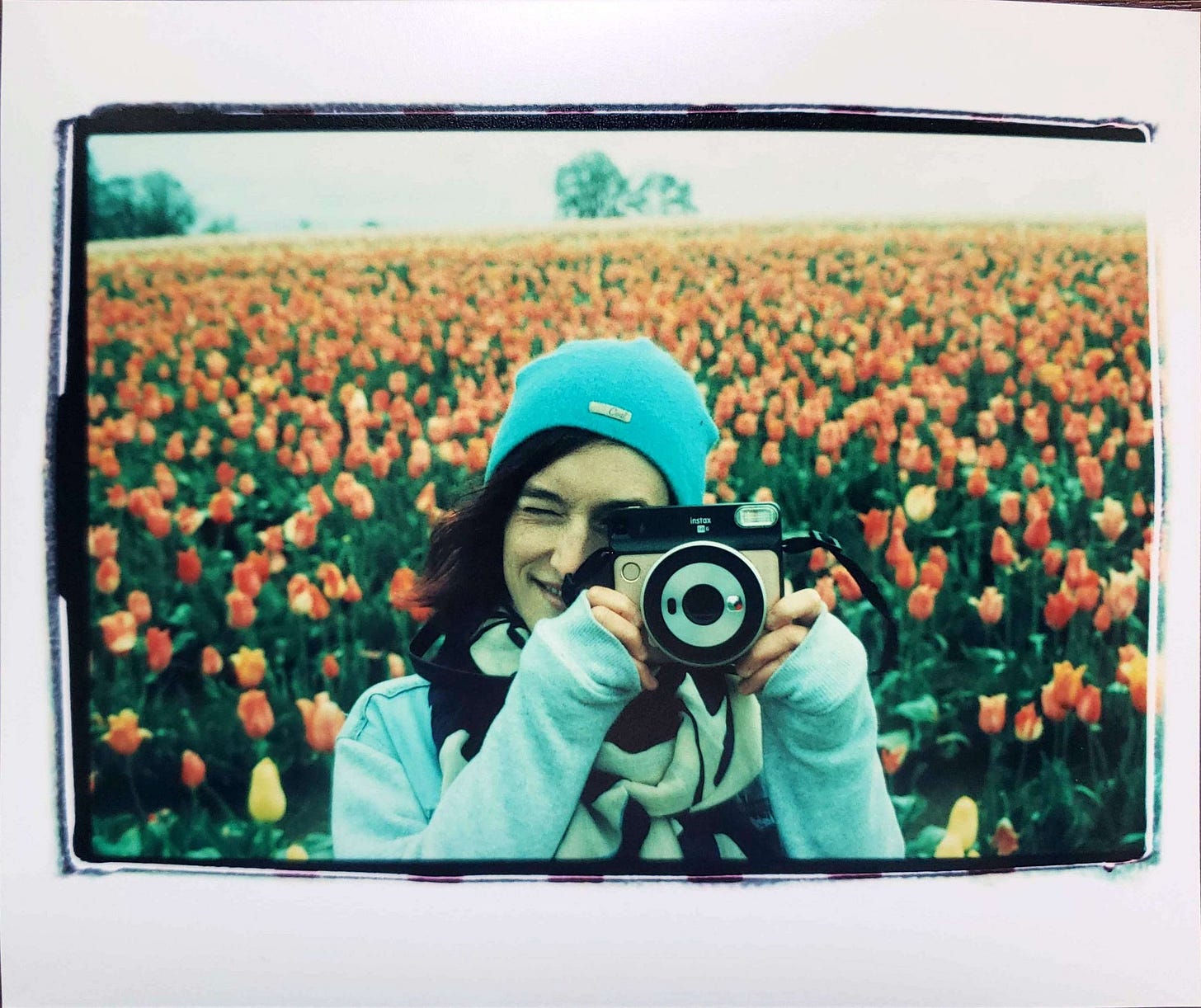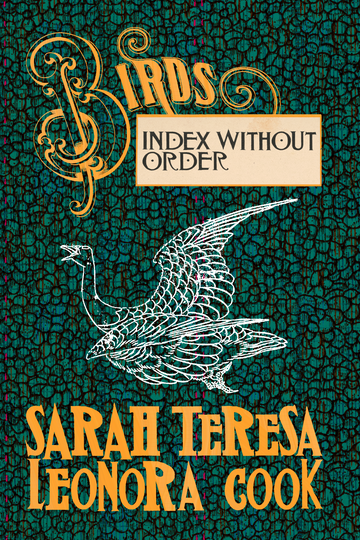Creative Dialogues is an ongoing project to learn from fellow artists. I’ve interviewed an astonishingly wonderful variety of creative individuals about their art, creative practices, and how they make it all work. I send every participant a list of questions about creativity and the creative practice. They respond to the five questions that resonate most, so every interview reflects the artist’s own curiosities and interests.
Today’s interview is with
, author of .
Sarah Teresa Cook (she/they) is an Autistic writer and poet, and she’s also a creative mentor and writing coach. She thinks of herself as a steward of creativity. Some things they really really love: bugs, scary movies, rollerblading, Hannah Gadsby, stickers, games shows, getting tattoos, eating spaghetti, and talking-thinking-writing about creativity.
—
If you were a piece of creative work, such as a book, song, or painting, what would you be? Why?
First thought, best thought: “Sky Seasoning,” by Shel Silverstein. I like the idea of being a poem about accidents, acceptance, and soup.
There are so many more obvious answers I could’ve given here — an Anne Sexton poem, a Clarice Lispector story, a Diane Arbus photo, all things I very much am. But the sad / ferocious / Fiona Apple thing inside me is kept in check by an external enthusiasm that is probably just as old, and certainly just as true. I remember reading Silverstein’s poems in second grade and thinking they were absolute magic, these little incantations that were somehow fun and weird and made me feel entirely transported, even while sitting in a room full of other students as Mrs. Wells read “Melinda Mae,” and “The Unicorn,” and “Falling Up.” I can’t think of a single thing worth comparing to Where the Sidewalk Ends. It’s just a little time capsule of perfection.
Plus, I hope to be entering my Shel Silverstein author photo era.
Sometimes I’ll go for a walk with a question in mind and tell myself that I’ll find the answer outside. There’s always an answer outside: three deer hanging out in someone’s unkempt backyard; an interesting piece of trash; birdsong I manage to identify without my phone.
Do you have a creative routine? If so, what is it? If not, why not?
I think this question is so especially important for neurodivergent writers.
Routine, familiarity, and belongingness are a key part of my emotional regulation… and yet I can’t seem to bring any of that into my writing practices (at least, not in a way I’m able to recognize).
I’m not sure why this is, though I have my hunches. What I do know is that I’m prolific — I’ve created multiple chapbooks, finished multiple full-length manuscripts; I overshoot my Substack publishing goal every month, etc.
So something is working, just not in a way I can measure or predict or contain. “Contain” really is the right word here. Writing feels like being in the ocean to me. It’s less about containing the thing and more about letting myself be contained by it.

How do you replenish your creative energy when you’re feeling depleted?
One of the strangest aspects of being Autistic is that engaging in our special interests can actually regulate and refuel us. This is true! I’m not just making this up.
So the issue becomes one of discernment: am I feeling depleted because I genuinely need rest, OR do I need to sit down with books and a blank page and let myself hyperfocus on my creative interests? Of course, Autistic folks can also struggle with reading our own internal cues, which means I’m still very much learning how to distinguish between the two.
When I need the latter, reading is the best place for me to start. Reading can also be a method of cuing myself. For example, if I’m wanting to write poetry, I sit down and read poetry. If prose is feeling more urgent, I’ll read nonfiction. I know this sounds simple, but there’s something really important happening here, where I use my impressionability to put myself into conversation with the thing I want to see more of.
I think this is another really important thing for neurodivergent creatives to think about: what kind of prompting do you need? I benefit from prompting around food and carrying a jacket, and I have a list taped to the back of my front door that reminds me what I need to bring when I leave the house. It isn’t just about memory — it’s about cuing.
I need this same stuff in my creative world, too. This can look like utilizing writing prompts, or cuing myself through curated reading, or doing some bibliomancy / drawing an oracle card. Sometimes I’ll go for a walk with a question in mind and tell myself that I’ll find the answer outside. There’s always an answer outside: three deer hanging out in someone’s unkempt backyard; an interesting piece of trash; birdsong I manage to identify without my phone. Sometimes we’re depleted, yes, but sometimes we’re chock full, and we just need a little bit of structure to help us get what’s inside out into the outside and onto the page.
Maybe your brain is full of beautiful chaos; maybe it doesn’t need to be tamed?

What is one thing you’d tell your younger self about building a creative practice?
Protect your enthusiasm. No, more than that: Trust your enthusiasm. The things that incite and excite you are never ever going to steer you wrong, because they can’t be wrong. And they can’t be compared to what other people are doing or making or getting excited about (or not). They’re just real and inside you and exactly what they are.
I think enthusiasm, more than any other feeling, is one of the quickest ways to orient back to ourselves and our purest, oldest creative impulses, the non-negotiable magical stuff.
Writing feels like being in the ocean to me. It’s less about containing the thing and more about letting myself be contained by it.
What is one thing you believe about creativity that most people would disagree with?
I don’t know if most people would disagree, but I think many traditional writing spaces operate according to an unspoken assumption that our experience of our own creativity is at odds with the development of our craft. I’m thinking here of an Annie Dillard passage from The Writing Life, about a naive photographer who mistakenly thinks one of his images is good because he had to climb a mountain in order to take it — i.e. he confuses effort with quality.
I don’t disagree with the distinction, but I just feel so tired of all this fretting over outcome at the expense of experience! I think we’re all very good at worrying about quality, especially when it comes to how someone else might receive us and our work. What I don’t see enough of is people who remember that they can have a private relationship with their creativity that is just as valuable as a public one. We don’t have to earn our creativity by making it accessible to the world, and we can care about craft and joy at the same time. They aren’t mutually exclusive! You can really really love writing and be good at it. But also? You don’t have to be.
I want every divergent writer who’s reading this to know that you can be without a polished, daily writing routine or strict practices and still be prolific and experience creative satisfaction.

What is one thing this community can do to support you and your work?
Becoming a free or paid subscriber of my Substack,
, is one of the most direct ways to support me!For paid readers, I host a virtual gathering called The Resiliency Circle. It’s one hour, once a month–a low commitment / high reward way to inject some creative nourishment into your monthly routine. We do some writing, chatting, reflecting — I always share the agenda in my newsletter in advance — and everything is done through a strengths-based lens. I’d love to invite readers from this community to join. (Yep: you!)
Any final thoughts on creativity you’d care to leave us with?
I want every divergent writer who’s reading this to know that you can be without a polished, daily writing routine or strict practices and still be prolific and experience creative satisfaction. Maybe your brain is full of beautiful chaos; maybe it doesn’t need to be tamed? I think we can work with our divergences in ways that help us thrive as-is. For me, one way that looks is really trying to undo my loyalty to consistency, as well as to being efficient, two words I’m coming to see as emblematic of neurotypical practices. If I use those words to measure my output, I’m never going to stack up. But am I devoted? Hell yes, and there is a softer, deeper kind of consistency to that. I’m also incredibly thorough, which I care about so much more than optimization.
We don’t have to earn our creativity by making it accessible to the world, and we can care about craft and joy at the same time. They aren’t mutually exclusive! You can really really love writing and be good at it. But also? You don’t have to be.
More ways to support Sarah:
Subscribe to
Buy their chapbook, Birds (index without order)








I knew I would love this but I didn't know exactly how much I needed it. Sarah you gifted genie... Thank you for existing and being so wonderfully articulate.💜
I love all of this, but especially: "Writing feels like being in the ocean to me. It’s less about containing the thing and more about letting myself be contained by it." <3